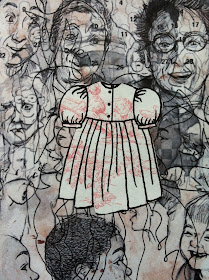I love the population density of NYC. I like people
watching. Sometimes other women just stop me in my tracks.
I'm sitting in an outdoor cafe. This is not something I do
often. A woman with dark hair walks by. Her hair is styled but not overdone.
There is a name for this hair. It is called beachy waves. Magazines like to
explain how to achieve these waves.
Some of her hair is its natural deep auburn color and some
of it is dyed a rich forest green. It shouldn't work but it does. It's not
haphazard. It’s not punky. It’s not garish. It is elegant. She is wearing an
autumnal green coat that is darker than her hair. The effect gives me the same
feeling I get looking at a beautiful painting.
This is a look I could not pull off. That is precisely what
I love about seeing this woman. This would look good on very few people. She is
one of them.
A middle-aged woman joins me on a subway platform. She's a
style train wreck but there is one bright spot. She has this cloth tote. The
construction and the luxe materials make me think that this is not a 5 or 10-dollar
bag. My guess was that it sets you back 50 dollars. Maybe more.
It has a youthful whimsy that evokes the patterns of
Marimekko if you mixed in a touch of Lily Pulitzer and Paul Rand.
This woman needs a total overhaul. Someone could help her
match her bag. As it stands now, the bag would look better on me. In other
words, I would like this bag.
I remember a woman from earlier in my life. A young social
worker from a Jewish organization would visit us when our son Jacob was
hospitalized. She was with us in some of our darkest moments. Jeremy and I discussed
the support she gave us. But we also talked about her clothes.
She was a member of the orthodox Jewish community. She
dressed modestly. Skirts had to fall well below the knee. Arms needed to be
covered. You can't be flashing skin around if you're her.
She conformed to all of the rules and regulations that her
culture asked of her. And then she totally rocked it.
The sweaters and skirts were chic. There was a little bit of
irreverence to some of her choices. She'd be covered up but the fabric design
would be fashion forward. Her pencil skirts didn't look frumpy. Something would
be a little asymmetrical or there would be a flirty element in the sleeve
detailing.
She brought to mind a modern version of Audrey Hepburn. And
even though fashion was the last thing on my mind and I could wear whatever I
damned well pleased, I borrowed elements of her look.
It's autumn. I stare at all of the shoes. I think that Cozy Mocs are over until I see this year's
version. They are more streamlined and less bedroom-slipper-like. There isn't
any fleece spilling out the sides. Indeed, the pair I have from 2014 are passé.
This is where it's at now. I want a piece of this action.
Ultra shiny ballet flats that match the woman's skin tone
exactly. Saturated coral lipstick on an otherwise subtle face. A young Columbia
student wears too much makeup, but gets away with it.
A 50 year old with a long blond/gray braid without a hint of
bright color on. She looks luminous rather than plain.
There is one man. His face, facial hair and man bun are
perfect. He is the only man in the world who looks good in a man bun. There is
a male fashion icon walking around the streets of NYC. It is he.
I jokingly think about women appropriating the man bun after
men appropriated the man bun from women. Then I see a woman who is clearly
doing this. It's incredible - no joke.
It's not the magazines or the runway shows that make me want
to expand what I will wear, or at least try stuff on. It’s the streets and the
subway. It's the hospital. It's Starbucks.
I'm on the A train now. A 70-year-old woman is sitting in
front of me. She's wearing scrubs, Crocs, is carrying an out of style purse,
and her glasses frames are neither here nor there. She has high cheekbones and
gorgeous tawny colored skin. The right photographer and hair and makeup could
turn her into a lifestyle model for AARP.
Her hair is thinning and is dyed bright magenta. I shouldn't
like it, but I do.
I wonder if infinity scarves are still in style until I see
a stunning young woman, sporting perfect mix of trendy and classic. She’s
wearing one. Apparently infinity scarves are safe for one more season.
I'm obsessed with Ombré but don't want to try it myself.
Same with matte lipstick and platform sneakers. I adore seeing this around.
Just not on me.
I do buy myself a pair of multicolored winter boots.
I am a photographer. I rarely photograph people. I've been
thinking about it though.
Last November, I was dining out with Jeremy and our willowy
waitress was dressed entirely in shades of cream with a chunky sweater and
thick infinity scarf. I went out of my comfort zone and asked if I could take
her picture. She was awfully nice about it.
But because of my nervousness I worked too fast. That and
the dim light made for a bad photograph.
I need to get ready.
I need to be ready to work quickly in less than ideal light.
This shouldn't be too hard. I'm used to this with my non-human subjects.
I need to rehearse a polite and authentic script. I don't
have to ask permission of the weeds and flowers and trash I photograph. I need
to have a quick explanation as to why I'm doing this. I have some figuring out
to do about that.
I need to anticipate a variety of responses. Some people are
going to think I am crazy. Some people are going to say no. For people who say
yes, I will have s small clipboard with forms where subjects can put their name
and email address. I will have business cards so they can check out my work.
No matter how terrific someone rocks their handbag or outfit
I won't stop them if they have that hurried look about them. I won't bother
them if they're texting.
"One important key to success is self-confidence. An important key to self-confidence is preparation." - Arthur Ashe
I’m at a gathering. I had some fun getting ready. I’m engaged
in an oft repeated, casual conversation with another woman. She admires my
outfit and asks me where I got it.
I tell her that the top is from the 96th street
Salvation Army, the skirt from Target, the tights and purse from Marshall’s and
the ballet flats from Payless.
My companion looks incredulous and delighted. Before she
asks me how I do it, I go ahead and tell her.
Most of the stuff you find in these places is crap, I say. What
you’re looking for is the diamond in the rough.
You might also enjoy:







